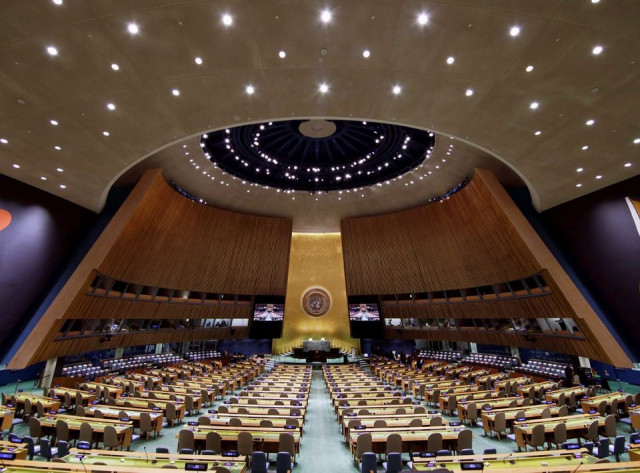At UN, Pakistan slams Israeli minister’s Al-Aqsa visit
Speaking for OIC, envoy says such situations must be dealt with strength, global law

Pakistan, speaking for the Organisation of Islamic Cooperation (OIC) at the UN, has condemned the visit to the Al-Aqsa Mosque compound by Israel’s new far-right security minister.
His remarks came after a UN Security Council (UNSC) meeting at which the 15-member body’s members called for preserving the historic status quo at Jerusalem’s holy sites.
“We strongly demand that such acts have to be stopped and they have to be stopped, forthwith”, Ambassador Aamir Khan, deputy permanent representative of Pakistan to the UN, told reporters at the UNSC, alongside all the ambassadors of Islamic countries.
The Pakistani envoy said the group met prior to the UNSC meeting at the request of Palestine’s Permanent Observer to the UN Ambassador Riaz Mansour, and condemned Israeli minister Itamar Ben-Gviri’s action.
“We have to deal with such situations with the strength and the force of international law,” Ambassador Khan added.
Ben-Gvir’s visit to the Al-Aqsa Mosque compound has enraged Palestinians and spurred worldwide condemnation amid warnings about Israeli plans to change the status quo of the holy sites.
At the UNSC meeting, Khaled Khiari, the UN assistant secretary general for the Middle East, said: “The situation at Jerusalem’s holy sites is deeply fragile, and any incident or tension there can spill over and cause violence throughout the occupied Palestinian territory, in Israel and elsewhere in the region.”
He urged the parties to refrain from escalating tensions and respect the status quo, which allowed Jews and Christians to visit the site at specific times but only Muslims to worship there.
The UNSC’s emergency meeting was requested by Palestine and Jordan and supported by its members -- the UAE, China, France, and Malta.
Israel’s new government was sworn in on December 29, along with Benjamin Netanyahu, who returned as prime minister for an unprecedented sixth term.
On Tuesday, its new national security minister, Ben-Gvir, accompanied by a heavy security detail, visited the compound that houses Al-Aqsa Mosque.
His visit marked the first time since 2017 that an Israeli minister had reached the site known as Haram al-Sharif by Muslims and Temple Mount by Jews.
Ambassador Mansour, the Palestinian envoy, said Ben-Gvir’s intentions were clear.
“He is pursuing the same extremist agenda he has pursued all his life: ending the historic and legal status quo. That is his objective, regardless of the consequences,” Mansour told the UNSC.
Israel’s UN envoy defended the national security minister’s actions.
“Minister Ben-Gvir’s recent visit to Temple Mount was not an incursion into Al-Aqsa or any other fabrication that the Palestinians branded his visit as,” Israeli Ambassador Gilad Erdan said.
He maintained that Ben-Gvir’s visit was in line with the status quo, and whoever claimed otherwise was only inflaming the situation. “Jews are allowed to visit the Temple Mount,” he added.
US Ambassador Robert Wood said at the council meeting that Washington expected the government of Israel to follow through on that commitment.
Jordan’s King Abdullah is the custodian of both Muslim and Christian holy sites in Jerusalem.
His envoy at the UN said Ben-Gvir’s unannounced presence was a status quo violation.
“This storming took place without the agreement of the Al Qaf administration, which is the legal agency in charge of the Haram [al-Sharif],” Ambassador Mahmoud Hmoud said.
He added that Israel had also violated an international convention and two UNSC resolutions -- one of which was adopted in 2000 in response to an incursion at the site by then-Israeli opposition leader Ariel Sharon.
That incident led to Palestinian protests and riots that grew into the second intifada (uprising), which lasted more than four years and was deadly for Palestinians and Israelis.
In his remarks, Ambassador Mansour called on the UNSC to take action.
“The record shows that Israeli persistence on this path does not lead to surrender but to uprising,” he said.
“Those committed to international law and peace must act now, not lament once the fire spreads beyond control,” he added.
The UNSC members expressed their concern about the escalating tensions and a need to maintain the status quo, refrain from unilateral actions that could undermine peace prospects, and return to political negotiations that could lead to a two-state solution.



















COMMENTS
Comments are moderated and generally will be posted if they are on-topic and not abusive.
For more information, please see our Comments FAQ